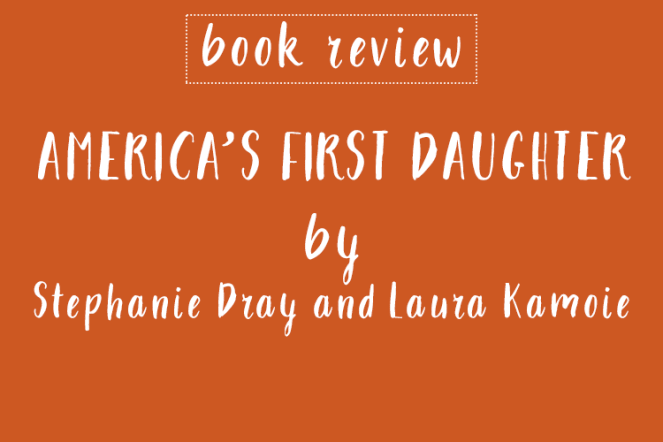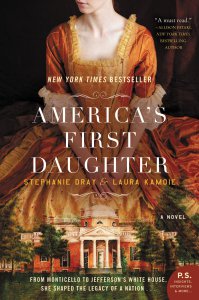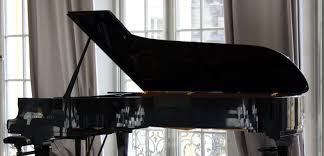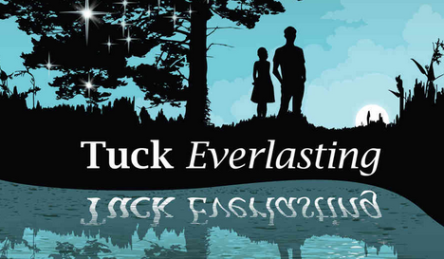
Title: America’s First Daughter
Authors: Stephanie Dray and Laura Kamoie
Year: 2016
Pages: 624
Dates Read: March 24 – May 27, 2017
Format: Kindle
Genres: HF, R
Rating: ★★
Summary: A novel of Martha “Patsy” Jefferson Randolph, the eldest daughter of the third president of the United States, Thomas Jefferson.
 What started out as a 4-star read for me, steadily became a 2-star one. I had hoped the story would involve less conjecture. Yes, there are parts that are based in history, but there are stronger, more effective parts that are not, namely Patsy’s romance with William Short and whether or not her husband Tom was as abusive as he is portrayed in this novel. When it comes to historical accuracy, I’m pretty lenient; however, when real people are portrayed with such extreme characteristics as the ones in this book are, those characteristics should be heavily influenced by proven facts. If we portray real historical figures as vehemently as these authors did without basing the most memorable parts of the story on truth, we create myths and legends that many people will believe to be true and spread as fact.
What started out as a 4-star read for me, steadily became a 2-star one. I had hoped the story would involve less conjecture. Yes, there are parts that are based in history, but there are stronger, more effective parts that are not, namely Patsy’s romance with William Short and whether or not her husband Tom was as abusive as he is portrayed in this novel. When it comes to historical accuracy, I’m pretty lenient; however, when real people are portrayed with such extreme characteristics as the ones in this book are, those characteristics should be heavily influenced by proven facts. If we portray real historical figures as vehemently as these authors did without basing the most memorable parts of the story on truth, we create myths and legends that many people will believe to be true and spread as fact.
Although Patsy sometimes annoyed me, I do think she’s the best written character in the entire novel. Everyone else–everyone–became irksome. Patsy got close, but not quite. What annoyed me the most was how much her father (either in his opinion or just his presence) influenced her most important life decisions, especially when it concerned her happiness. Her father wasn’t the only one who did this; it was men in general. I can’t recall a single moment in the novel when Patsy gets to be her own person. She’s always a man’s something.
Given the glee with which Richard celebrated the verdict, hooting with no sense of decorum, he seemed to believe himself vindicated. His honor restored. I knew better. In the end, he’d been saved by women. By Nancy’s willingness to sacrifice her own honor by writing that letter, by my willingness to lie, and even by his poor betrayed wife. (Loc 5197)
It’s easy to be blinded by these nice feminist passages that appear throughout the text, but the sad truth is that Dray and Kamoie portray Patsy in a rather patriarchal light. Her life is, for the most part, focused on and controlled by the men around her. In the 18th century, this canhardly be avoided in America; however, the authors took liberties with men in this novel. Ah, women taking control of me, you might think. But there’s a problem. The authorial liberties they took with William Short and Tom Randolph, for instance, affect Patsy’s life immensely in the novel. First, the (unproved) relationshop with Short influences her choices and takes away some of her agency (when he proposes to her, Thomas Jefferson doesn’t allow their marriage, even though it would have made her happy). They portray the relationship with Randolph as one that became abusive. While there is proof that their marriage became an unhappy one–although I may be wrong about this–I don’t think there is any evidence that it was abusive. It very well may have been, but we don’t know that. Through their admitted dramatization of their marriage, they put Patsy in an abusive relationship. Overall, most of the decisions Patsy makes, especially toward the beginning of the novel, are because of men, mainly her father. Yes, there is this important moment of helping her sister-in-law Nancy after her dalliances with her brother-in-law, but it ultimately helps Richard, as well.
He had inside him the kind of wound that left a man staring at pistols in the night. The kind of wound that left a man without a head, lying on the ground with a gun in his hand. The kind of wound the men in my life all seemed to suffer. And for the first time, I wondered if those wounds were put there by God or if it was something about me that brought them about. (Loc 7233)
Even though the men are the hotheads, she erases their blame. (And, since these aren’t Patsy’s own words and thoughts, this means that Dray and Kamoie essentially erase their blame.) It’s either her fault or God’s. It’s the old “boys will be boys” argument. If it’s because of God, then they were made that way and can’t help it. If it is beause of Patsy, then she is at fault for these men’s decisions. Either way, the men in this novel escape culpability too many times.
Toward the end of the novel, Patsy tries to take control: “Seeing my son half-dead, something changed in me—my willingness to obey, my willingness to accept, to let the men handle it was gone (Loc 8107).” It’s great that she comes to this decision of her own volition, but is it a little too late?
Because I’m my father’s daughter. (Loc 8932)
Oh, how I wish you weren’t, Patsy. He’s the ultimate reason for your unhappiness. It can all be traced back to him. You wouldn’t have even married Tom if it weren’t for your father.
At first, my steps are bent and painful. But the farther I walk, the less I feel the pull. Mindful of the cold muck on my feet, I straighten like the Amazon William always said I was. Like the Amazon I am. (Loc 9705)
She finally walks away from the cage of Monticello, but at this point, after all I’ve been through in reading this book, I struggle to care.
The Book Depository | Amazon | Audible | Library | Goodreads
Advertisements Share this:





